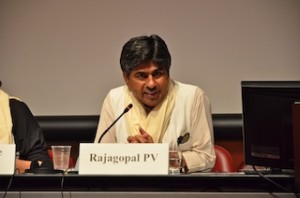According to IFRI (International Food Policy Research Institute), more than 165000 farmers committed suicide in India since 1997. 1500 small peasants committed a “collective” suicide in 2009 in the indian state of Chhattisgarh. This reality is unacceptable in itself, and many explanations are given to understand it (use of GMO, pesticides, overdebts, droughts, etc.), although nothing seems to be done to counter this vicious circle. This challenge is a global one, especially as many serious studies made clear that the sustainability of small farmers is the guarantee of the production of food for all.
This is why Ekta Parishad supports the Declaration for Peasant’s rights from Via Campesina in collaboration with CETIM, and moreover extends this claims to the rights of all landless and marginalised communities.
Declaration of Rajagopal PV, President of Ekta Parishad, about peasant’s rights
“ Jan Satyagraha is a year-long process organized by Ekta Parishad and supported by 2000 organizations to bring together landless dalits, adivasis, fisherfolks, women, urban poor and sexually vulnerable groups of India to demand control over land and livelihood resources. During this year, social activists representing different struggles will travel across India to highlight the campaigns that are happening on the ground and engage the state and other concerned actors in a process of dialog to find solutions to the problems of deprived communities. This process will culminate in a 35-day footmarch by 100,000 people from the deprived communities covering a distance of 350 kilometers to apply pressure on the state to bring about policy changes. The larger question that Jan Satyagraha will raise will be related to people’s control over land and livelihood resources in order to fight poverty as opposed to the exploitation of these resources by the corporate houses for profit. The movement is an effort to question the globalization and neo-liberal framework for development and to propose a policy framework which promotes a development model that ensures justice and equity. In this connection, Jan Satyagraha 2012 is in full support of the ‘Declaration of Peasant Rights- Women and Men’ proposed by Via Campesina to the UN body. To address global poverty, rights over land and livelihood for landless communities cannot be separated from the rights of peasants.
The spike in farmer suicides around the world is a clear indicator of the failure of the current model of development. The recent economic crisis confirms the failure of the current development paradigm in ensuring just and equitable development but an alternate paradigm has not yet emerged. Rights over land and livelihood resources will be a step towards creating a just and equitable world order. International bodies like the UN need to play an important role in facilitating this process of developing the alternative paradigm by not only adopting the declaration by Via Campesina but also extending it to make rights over land and livelihood resources for marginalized communities in rural areas and the rights for a decent place to live for urban and rural poor as a fundamental human right. Such an international framework will support the work of social activists in persuading their respective governments to create policy and implementation frameworks that provides deprived communities with opportunities to take control over their lives and live a life of dignity and self-respect. Jan Satyagraha appeals to human rights activists around the world to take up the issue of people’s control over land and livelihood resources as a human right as this will enable us to defend other human rights.”

Non-violent peasant’s struggle in India, a story
Throughout India, Ekta Parishad supports farmers struggling to keep the land that powerful people, State or companies want to acquire. This is the case of farmers of Jagatsinghpur district, in Odisha, who are facing POSCO, a steel company which wants to implement a huge steel complex in the region. In 2005, the State agreed to allocate 1200 ha of land for this project. But this is not vacant land, as many families are living here since several generations and cultivating the land to make a living. According to an Indian law, the Forest Rights Act 2006, these people should be the legal owners of this land, but in the face of financial interests of private companies, peasants’ rights are denied. Furthermore, this process of land acquisition is against the basic human rights, like food right, as it would take away the livelihood resources of thousands of people. Supported by several organizations, including Ekta Parishad, villagers are struggling non-violently to stop this project. A few days back, on March 30th, the struggle had a first success: a tribunal has suspended the environment clearance of POSCO. But it is just a delay for the project implementation. The real victory would be to stop definitively that kind of project by recognizing that peasants’ rights, and more generally human rights, are more important than industrialization.